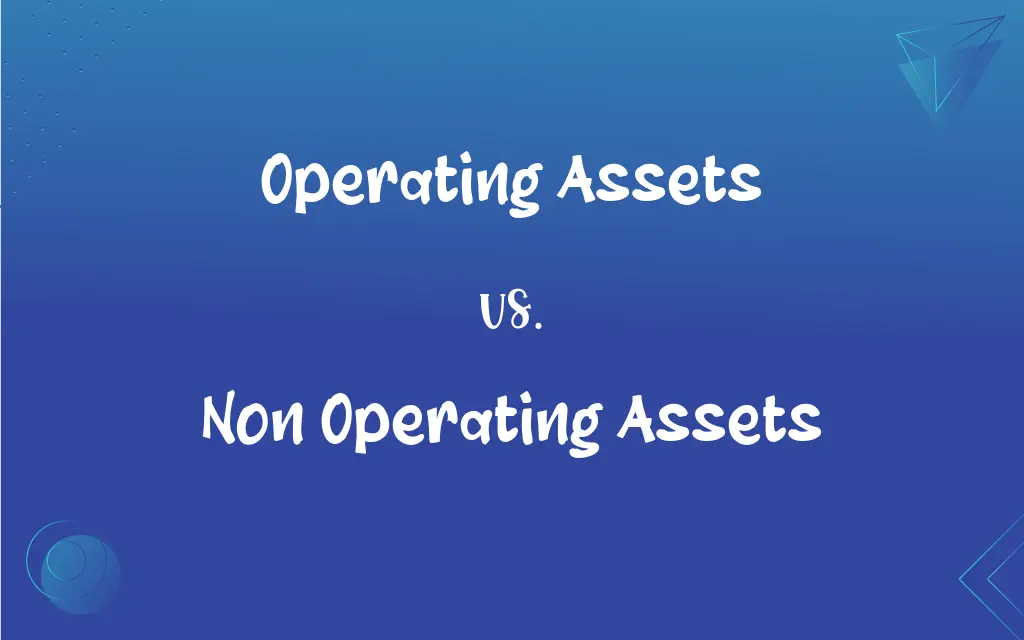Operating Assets vs. Non Operating Assets: What's the Difference?
Edited by Aimie Carlson || By Harlon Moss || Published on February 22, 2024
Operating assets are essential for a company's core business activities, while non-operating assets are not directly tied to primary business operations.

Key Differences
Operating assets are integral to the primary business activities of a company, directly contributing to its core operations and revenue generation. Non-operating assets, on the other hand, are not directly involved in the company's main business activities.
Examples of operating assets include machinery, inventory, and accounts receivable, all crucial for daily business functions. Non-operating assets, such as investment properties or idle land, are not essential for regular business operations.
n financial statements, operating assets are listed as part of the company’s core business assets, reflecting their role in generating income. Non-operating assets are reported separately, as they are not central to the primary business functions.
The value of operating assets directly influences the valuation of a company's core business, while non-operating assets contribute to the overall value but are separate from the main business valuation.
Management decisions and strategies are often focused on optimizing operating assets for efficient business operations, whereas non-operating assets might be managed with different objectives, such as investment or divestment strategies.
ADVERTISEMENT
Comparison Chart
Role in Business
Essential for primary operations and revenue
Not directly tied to primary business activities
Examples
Machinery, inventory, accounts receivable
Investment properties, idle land
Financial Reporting
Listed as core business assets
Reported separately from core business assets
Impact on Valuation
Directly affects business valuation
Contributes to overall value, not core business
Management Focus
Optimized for business efficiency
Managed for investment or divestment
ADVERTISEMENT
Operating Assets and Non Operating Assets Definitions
Operating Assets
Assets reflected on the balance sheet that are crucial for daily business functions.
The warehouse facilities are among the key operating assets for storage and distribution.
Non Operating Assets
Assets that do not directly contribute to the production of goods or services.
The historic building owned by the company is a non-operating asset.
Operating Assets
Assets used in the core operations of a business.
The new printing press is a crucial operating asset for our publishing company.
Non Operating Assets
Assets that are incidental to the main business activities.
The unused factory equipment is a non-operating asset since it's not in use.
Operating Assets
Assets that are actively used and managed as part of a company's core business.
The company's software and hardware systems are important operating assets for our IT department.
Non Operating Assets
Assets not necessary for a company's primary business operations.
The vacant land on the outskirts of the city is a non-operating asset.
Operating Assets
Assets that generate revenue and profits.
Our fleet of delivery trucks are essential operating assets for logistics.
Non Operating Assets
Assets held for investment purposes.
The stock portfolio is classified as a non-operating asset.
Operating Assets
Tangible or intangible assets directly involved in producing goods or services.
The patented technology is a valuable operating asset for the firm.
Non Operating Assets
Assets that may be liquidated without disrupting business operations.
The company's art collection is considered a non-operating asset.
FAQs
Are operating assets always tangible?
No, they can be intangible, like patents or software.
Do operating assets directly affect profitability?
Yes, they are critical to revenue generation and profitability.
How do operating assets impact liquidity?
They are less liquid, as they are tied up in core business activities.
Can the sale of operating assets disrupt business?
Yes, it can impact the company’s ability to operate effectively.
Are non-operating assets considered in company valuation?
Yes, but separately from the valuation of core business operations.
Can non-operating assets provide passive income?
Yes, especially if they are investment properties or financial investments.
Can the sale of non-operating assets boost cash flow?
Yes, selling these assets can provide a cash influx.
Can non-operating assets become operating assets?
Yes, if they are repurposed for core business functions.
Do non-operating assets contribute to operational risk?
Generally no, as they are not involved in daily operations.
Are non-operating assets always non-essential?
They are non-essential for core operations but can be important for overall financial health.
Are operating assets frequently replaced?
It depends on the asset's lifecycle and business needs.
Do non-operating assets require maintenance?
Yes, they may require maintenance, especially if they are tangible assets.
Are non-operating assets listed on balance sheets?
Yes, but separately from operating assets.
Is depreciation applicable to operating assets?
Yes, especially for tangible operating assets like machinery.
How do companies finance operating assets?
Through revenue, loans, or capital investments.
Do operating assets vary by industry?
Yes, they depend on the nature and needs of the business.
Can operating assets be leased?
Yes, companies often lease assets like equipment or vehicles.
Are operating assets critical for growth?
Yes, they are essential for expanding business operations.
Is insurance required for non-operating assets?
It depends on the asset type and company policy.
Do non-operating assets affect tax liabilities?
They can, depending on their type and how they are used.
About Author
Written by
Harlon MossHarlon is a seasoned quality moderator and accomplished content writer for Difference Wiki. An alumnus of the prestigious University of California, he earned his degree in Computer Science. Leveraging his academic background, Harlon brings a meticulous and informed perspective to his work, ensuring content accuracy and excellence.
Edited by
Aimie CarlsonAimie Carlson, holding a master's degree in English literature, is a fervent English language enthusiast. She lends her writing talents to Difference Wiki, a prominent website that specializes in comparisons, offering readers insightful analyses that both captivate and inform.







































































